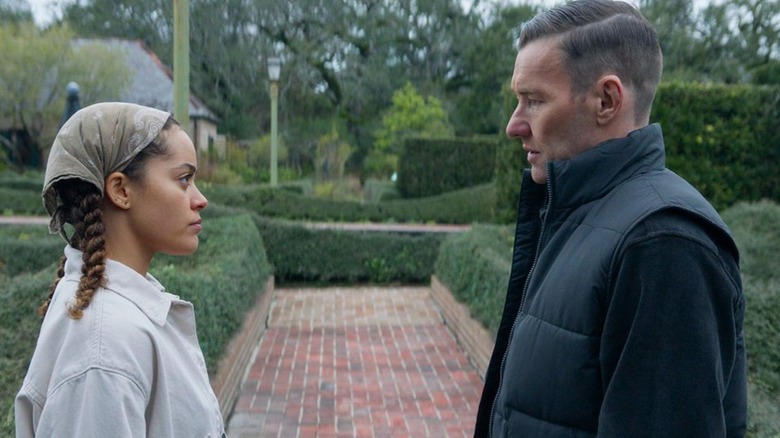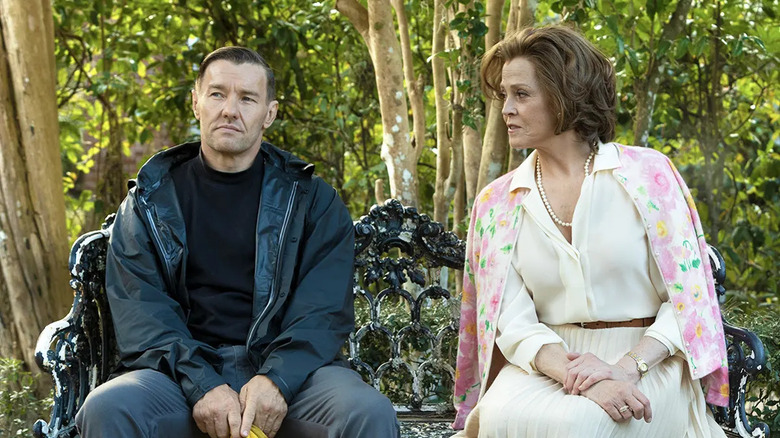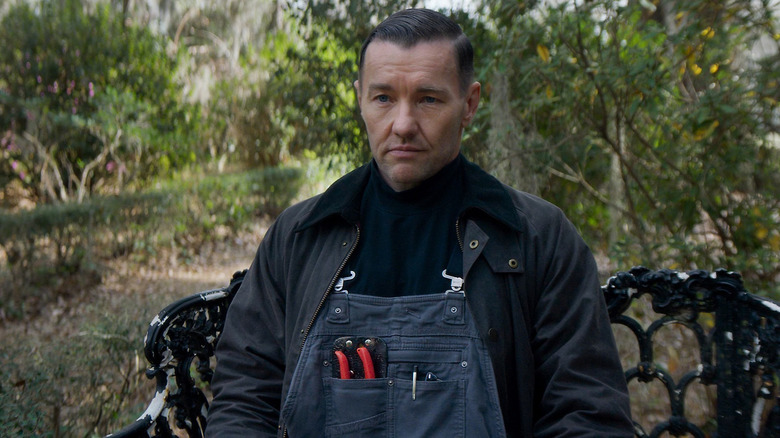Master Gardener Review: Plants Intriguing Seeds That Don't Grow
- If you view this as a dark parody of the "white people solve racism" brand of Oscar bait, then this is every bit as provocative as it looks from the outside.
- If you don't, then this feels like Paul Schrader veering into self parody, with a brooding protagonist nowhere near as interesting as those in "First Reformed" and "The Card Counter."
For a writer-director with a diverse filmography dating back nearly 50 years, it's remarkable how much Paul Schrader's work of late can be summarized as "brooding character studies of tortured, lonely men, sharing their internal conflicts by candlelight with their diaries and glasses of whisky." When one of the first sights we see in "Master Gardener" is Joel Edgerton's Neo-Nazi-turned-horticulturist Narvel Roth penning an elaborate metaphor for his own tortured past via the planting of flowers, my immediate gut feeling was that Schrader had finally arrived in self-parody territory.
It isn't that this framing device was particularly fresh in his prior efforts "First Reformed" and "The Card Counter," two of the best films of their respective years, but that this literary approach at which he first tried his hand with the screenplay to "Taxi Driver" (which, in turn, has its roots in the earliest works of French filmmaker Robert Bresson) felt newly rejuvenated there. Here, it feels like a return to the well — and that sets the tone for the movie to come.
"First Reformed" was a searing study into a man of the cloth having a crisis of faith after uncovering church financial ties to oil companies, while "The Card Counter" was a grueling account of a former soldier's attempt at moral redemption after torturing prisoners at Abu Ghraib. Both are about conflicted figures who have found themselves embedded within systems unwilling to change for the better, and the impossibility of closure when you're powerless to prevent future atrocities or atone for previous ones. Although likened to the third part of a trilogy by some, "Master Gardener" falls short in this regard, the tricky moral compass of its former white supremacist lead nowhere near as intriguing to explore in-depth as Schrader's previous anti-heroes. Dramatic character studies of supposedly reformed Nazis are hardly novel (the Ryan Gosling vehicle "The Believer" frequently came to mind watching this), and even in Schrader's hands, this complicated figure remains one-dimensional.
Schrader at his most familiar — despite the controversial subject matter
It takes the film 20 minutes to Narvel's hidden identity, with Dev Hynes' pulsating score growing harsher as we pan across Joel Edgerton's back tattoos. It's a moment treated within the drama as some sort of twist, although it remains unclear just how many others are aware of his identity. He works for wealthy widow Mrs. Haverhill (Sigourney Weaver) as the lead gardener on her lavish estate, occasionally sleeping with her, an arrangement that has led to her being familiar -– and seemingly unperturbed –- by the extensive amount of Third Reich artwork etched onto his body.
But beyond her, he remains suitably hidden from the world, even if his outward appearance can make him look like a Richard Spencer-type (in one sequence, a character even insults him by calling him a "Proud Boy," the name of a far-right group). Robert Bresson, Paul Schrader's biggest influence, famously focused extensively on the hands of his protagonists as he felt they were the most expressive part of the body. Edgerton's are, quite pointedly, covered by gardening gloves for the vast majority of the first half; by not seeing this direct expression of his true self, you too could believe he was a likeable, affable boss on the estate.
This starts to change when Haverhill's great-niece Maya (Quintessa Swindell) arrives, and Narvel is tasked with making her his apprentice -– it's glaringly obvious that Haverhill has nothing but disdain for her mixed-race niece, with a racist undercurrent to the various criticisms she airs about that side of her family, only heightened by consciously making a former Neo-Nazi her superior in the workplace. Within a drama that otherwise hits all of its thematic beats with the subtlety of a sledgehammer, the power dynamics among these three characters represent the film at its most rewarding. Unfortunately, the film eventually changes gears to become an unsatisfying "Taxi Driver" retread, as the anti-hero we know harbors prejudiced beliefs sets out on a singular redemptive arc to "save" a younger female character.
The crime drama that follows manages to remain generic despite the unusual tone surrounding it, and subject matter that should be incendiary and prone to provoking intense critical debates. Even as it tackles hot-button issues with seemingly no care as to whether it stokes controversy, the feeling that Schrader has already tackled similar thematic material to much greater success is inescapable -– it's hard to find anything controversial within something so familiar, no matter how much trouble it flirts with throughout.
Interesting as a writing exercise — but not as a fully realized drama
Paul Schrader was only nominated for his first Best Original Screenplay Oscar, for "First Reformed," back in early 2019, getting beaten by "Green Book." At times, "Master Gardener" feels like the effort a writer would consciously pen in response to a film within that embarrassing awards-friendly category, the "white people solve racism" movie, taking that genre to its most illogical extreme and culminating at the most ludicrous conclusion conceivable. Only if you view this film as a deliberate writing exercise on this level, depicting a blossoming relationship between a middle-aged former Nazi and a younger person of color, does it feel as provocative as it's being made out to be: a middle-finger toward the film industry old guard who regularly award stories not entirely dissimilar from this one, by revealing just how insidious the genre can be if given more thought. Unfortunately, this still doesn't elevate it into captivating drama -– it's kept at a stilted remove in comparison to the two Schrader films which preceded it.
That stilted nature can be further evidenced in the overly mannered dialogue, something that feels more of a bug than a feature here in comparison to other Schrader works due to Sigourney Weaver's supporting performance. When acting against Joel Edgerton, who always maintains his brooding machismo, her turn feels like one of misjudged camp, an over-the-top performance slotted into a more insular character study. Weaver is clearly having the time of her life, but it's no coincidence that the screenplay's clunky dialogue is most pronounced when it's being delivered by her; one highlight sees her yelling at Narvel, "I thought you had a green thumb, I didn't realize it was a green middle finger!" There's plenty of dark comedy to be found coursing through the veins of Schrader's writing, but a lot of the dialogue this time around is ham-fisted, feeling uncharacteristically like an early draft that got filmed by accident.
If "First Reformed" and "The Card Counter" rejuvenated Schrader's career by stripping his thematic obsessions down to their bare essentials, then "Master Gardener" is the first sign of tiredness in his approach. As much as I suspect there is more genius to be found by exploring another tortured soul and the darkest thoughts in his diary, this veers perilously close to self-parody. I need a much more unique, intriguingly complicated protagonist in his next outing to prove there's still plenty of mileage in the Schrader wheelhouse yet.
"Master Gardener" premieres in theaters on May 19.


